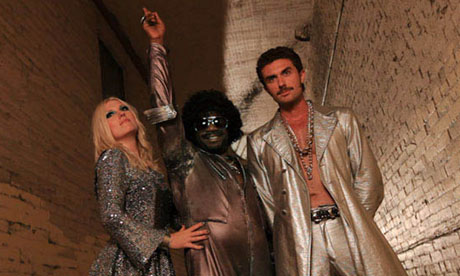 |
| Why did they bother with this bit? The documentary footage was fine. |
I know you love the night life, Eric. What's your first thought on this piece?
Eric Karoulla: It seemed to try too hard to create a cohesive narrative for disco that didn't really exist. The film talked about the context and time-period at which disco came about, as well as what it did in the way of liberation of gays and women. While the history and context of disco were quite intriguing to learn about, the part about the 'masterminds of disco' seemed stretching it a bit, and undermined the entire validity of the information given.
What about you?
Gareth K Vile: I hated all that stuff where they had these three characters dressed up in disco outfits acting like they were masterminding a conspiracy to liberate the world through a four to the four beat. Especially when most of the people who actually made the music were all about the money. Sure, we saw some hatred for the disco, but the attempt to class that big event where they blew up loads of disco albums as a homophobic backlash... well, given that we'd just heard Disco Duck or something equally painful, it was hard to hold the faith in the music at that point. However, I did love the bit where The Village People explained why they stopped being famous. What did you make of that scene, where The VP were interviewed and got upset?
EK: It was interesting, because it seemed to show that the film was made without any proper referral to the voices and faces of disco. As if they didn't ask them, or well, perhaps they asked the wrong people. Clearly, there was a divide between the producer/lyricist, and the performers, which I suppose is still the case in the music business; those on the outside see it very differently to those on the inside. Furthermore, it just appeared as though the interviewer went there with an agenda, as if they planned to pit the lyricist against the performers and vice vera, to create a little friction or controversy, where none was required. Personally, I felt it was unnecessary, and would have liked to learn more about the history of disco, although I think some of the bands they used were actually soul bands - which could have been more interesting. I'm a soul soulja, I guess. What did you think of it - especially when they brought in Barry White?
GKV: I think you'll find that is spelled "soldier." And Barry White - he was ruined for me a few years ago when Vic Reeves impersonated him with a northern accent. They had some talking heads - mostly black female singers - who felt very exploited by the whole process and some others - white male producers - who thought it was great. And then they got to the high point of disco - Studio 54 - and it was all white heterosexuals having sex and taking drugs, with the odd "character" off to the side, being interesting and a token gesture to inclusion.
To be honest, I don't think disco was more exploitative than any other popular music movement during the 1970s - punk had really issues with gay men and women - but there was this slightly desperate attempt to include all minorities under disco's banner. Sure, it had a gay following, but was it really liberating for women? The album covers look pretty soft core pornography to me. And what did you make of the scholar who stated that I Feel Love was a manifesto for the female orgasm?
EK: Well, soft core pornography was almost legal at the time, wasn't it? I mean... censors didn't really have jobs until political correctness and age ratings came into play. As for the scholar, she seemed to be trying to glorify disco because she liked it. That connection was a little far-fetched, although I can see where, in the context of sexual liberation, it is possible. But then, if it was a feminist sexual liberation manifesto, how did that make it okay to have nude/half-nude women on album covers? Also, I think she tried to make excuses for it by saying it was about being comfortable with the female body and such, but really it comes down to commodification, doesn't it?
GKV: I think it was legal, but I don't think that the screaming nudey lady show ought to be in the public domain. And political correctness might be a response to the lack of censorship. However, that's for another time... and you are bang on about that commodification.
There it is though: capitalism will pretend anything is radical, if it has a chance to make another buck from it. But, on balance, if the film had got rid of the posturing, it would have made a good BBC3 retro special, I suppose.
No comments :
Post a Comment